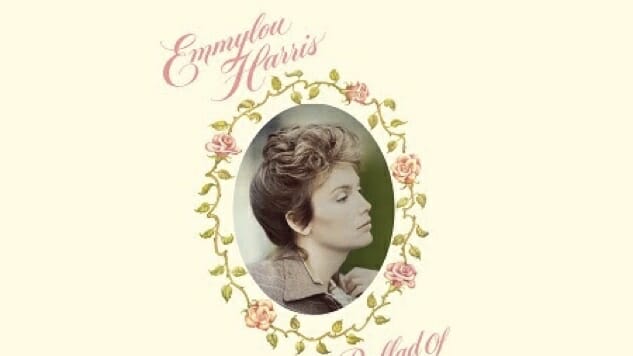Emmylou Harris’ Overlooked Country Opera, The Ballad of Sally Rose

The Ballad of Sally Rose has been largely overlooked for more than 30 years, but the album was pivotal for Emmylou Harris—even if it wasn’t apparent at the time. Despite hitting No. 8 on the Billboard Country Albums chart and getting Harris nominated for a Grammy, the singer has said her 1985 “country opera” concept album was a commercial disaster.
Yet The Ballad of Sally Rose, reissued June 1, did several important things for Harris. With vocal contributions throughout from Dolly Parton and Linda Ronstadt, the album helped jumpstart a collaboration the singers had been talking about since the late 1970s. The resulting Trio LP released in 1987 went platinum, and ranks among each woman’s best-selling work. Sally Rose also showed that Harris could be as potent a songwriter as she was an interpreter: she had a hand in writing all 13 tracks on the album, marking the first time since her 1969 debut that Harris had included more than a handful of her own songs on a release. She wouldn’t do it again until Red Dirt Girl in 2000.
“I felt if I didn’t get the writing part of me going, I had just done everything,” Harris told the Chicago Tribune in 1986. “I mean, I could continue to find good songs and make good records, but if I was going to keep on, I was going to have to prove myself to myself.”
She succeeded: Harris has described The Ballad of Sally Rose as a favorite from her discography. The album tells the story of a young woman who meets a famous singer and joins his band. They fall in love as she develops her own voice, then part when complications ensue, and he dies in a car accident before they can reconcile. Harris had pieces of a few songs on the album dating as far back as the late ’70s, but it wasn’t until she teamed with the songwriter and producer Paul Kennerley that the writing took off. “I was completely stuck. And we set about and in 10 days finished six songs in the first writing we did together,” she told the Chicago Tribune in 1985.
Like a lot of country records in the ’80s, it has a glossy sheen, but the sleek production on some tunes (by Harris and Kennerley, who would soon become her third husband) never overshadows the songwriting. Harris is a deft lyricist on songs full of vivid imagery that includes allusions to hymns, gospel and the American west, and her melodies—or even just phrases—frame the ache in her voice in a way that can break your heart. She finds solace in her own perseverance on “Diamond in My Crown,” lets her powerful voice carry the pulsing country-rocker “White Line” and mourns from a seemingly bottomless reservoir of feeling on “Sweet Chariot.” With its layers of rich vocal harmony and elegiac lyrics—she sings on the chorus, “Swing down sweet chariot / The flesh will fall and the bones will rot / But from my sorrow you’ll carry me not / My heart is bound, my soul is chained to the rock”—the song ranks among the best she has ever written.
“She’s iconic,” says Emory Gordy Jr., who played bass and acoustic guitar and wrote string arrangements for the album, which also includes contributions from Waylon Jennings, Albert Lee and Vince Gill. “You listen to her voice, it’s unmistakable. You listen to her delivery, and her soul, it’s just immaculate.”
That’s true even on the demos. The reissue includes bare-bones versions of 10 songs that feature Harris singing accompanied only by an acoustic guitar—and spellbinding vocal harmonies she overdubbed as a guide for Parton, Ronstadt and the other backing vocalists. “When I hear her voice, it moves me somehow. It touches my soul,” Parton tells Paste. “I love our voices together. I love how our harmonies blend, our voices are enough alike that they’re real compatible.”
-

-

-

-

-

-

-

-

-

-

-

-

-

-

-

-

-

-

-

-

-

-

-

-

-

-

-

-

-

-

-

-

-

-

-

-

-

-

-

-








































